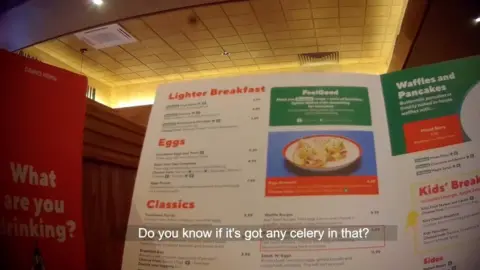Restaurant and cafe chains giving out 'dangerous' allergy advice
 BBC
BBC Leading restaurant and coffee shop chains are giving out incorrect allergy advice, BBC Watchdog Live has found.
Posing as customers with food allergies, journalists secretly filmed staff at Frankie & Benny's, Pizza Hut, Nandos, Pizza Express, Starbucks and Costa.
The journalists asked staff whether dishes contained any of the 14 major allergens.
Five out of the 30 outlets visited gave the reporters incorrect information.
One nut allergy sufferer, Frank Halton, told the BBC: "We're reliant on people having the right attitude and, you know, taking us seriously."
The unclear and incorrect advice could have caused anyone with a genuine allergy to have a potentially life-threatening reaction.
By law, cafes, restaurants and takeaways should be able to give customers clear information about which dishes contain allergens.
None of the outlets visited had allergens listed on menus or labels, so customers must rely on staff being able to give accurate information.
Watchdog Live's journalists asked staff if specific dishes contained one of the 14 major allergens, including nuts, mustard and celery - which is often used as flavouring in stocks and sauces.
Out of the six chains, only Pizza Express gave accurate advice in each of the five branches visited.
Starbucks, Costa, Frankie & Benny's and Nando's said that the incidents Watchdog's undercover team experienced fell short of their usual standards.
They told the programme they've addressed the issues with staff at both a regional and national level.
Pizza Hut told the BBC that while the information provided to Watchdog's undercover journalist was ultimately correct, it is now taking steps to make allergy information clearer.
The pizza chain is introducing QR codes on menu cards this week, and will be making the font size of text in its nutritional guide bigger in the new year.
"Five is a significant number and if you scale it up nationally, it becomes a very, very large number indeed," said Tony Lewis, the Chartered Institute of Environmental Health's head of policy.
"And that's worrying, that there's businesses out there that will be asked by people with allergies, for information, and they're not being given the right information or they're being misled in some instances. That's really scary and that's what bothers me a lot."
Unclear allergy information
At a Costa Coffee branch, the reporter asked for a mince pie they knew contained milk, however even after thoroughly consulting the allergy book they were told by staff that it contained soya milk. Mr Lewis said this result worried him the most.
In one Frankie & Benny's restaurant the undercover journalist told staff she had a celery allergy and enquired about eggs royale, which contains celery, according to the company's website. The server did not at any point consult a product information guide or check with the kitchen, but assured the journalist that the dish didn't contain any celery.
In a branch of Pizza Hut, a reporter asked if the mac n' cheese contained mustard, which is listed as an ingredient on the company's website.
A member of staff showed the reporter a book containing allergy advice, but neither the reporter or the staff member could understand the information in the book.

When the reporter asked if the pepperoni pizza contained mustard, he was told that the member of staff couldn't give him any more information than that listed in the allergy book, which was unclear.
At a Nando's restaurant, the reporter asked if a burger contained mustard.
The server guessed that it didn't, but on checking the allergen book, discovered that the burger did in fact contain the ingredient.
While in one branch of Starbucks the advice was ambiguous, with a staff member initially telling the reporter the item he'd chosen - a lemon loaf cake with almonds in the ingredients - did not contain nuts, but ultimately advising there was still a risk of nut contamination.
Signing a form
At one Frankie and Benny's restaurant, a reporter was asked to agree to terms and conditions that state Frankie and Benny's can never guarantee that a dish is completely free of any allergen - except for gluten.
The server told the reporter the form "saves our back".
Mr Halton and his partner Matilda Ryley-Hicks, who both have a nut allergy, had a similar experience.
When Ms Ryley-Hicks mentioned the allergies to staff in a branch of the chain Coast to Coast - which is owned by the same company as Frankie and Benny's - she was shocked to be given an agreement to sign.
She was handed an iPad and asked to sign terms and conditions acknowledging that the restaurant couldn't guarantee any dish was free from allergens.
Feeling the restaurant was passing the buck for anything that might happen, she got up and walked out.
Ms Ryley-Hicks said she felt embarrassed telling people in a restaurant about her allergy, especially when with a big group, as it made the whole meal awkward.
"We deserve to live our lives as much as everybody else does - and we deserve to go out and enjoy eating in a restaurant as much as the next man," added Mr Halton.
Coast To Coast and Frankie & Benny's owner The Restaurant Group told Watchdog Live that the allergy advice presented to customers to read and tick is not a disclaimer.
The firm added that it does not ask its customers to waive their rights.
The findings come three weeks after Watchdog Live found supermarket bakery counters giving dangerous allergy information, prompting Sainsbury's and Asda to pledge to introduce allergy labels on all in-store bakery products.
